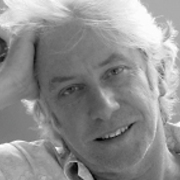
Tim Woodhouse
Since moving to New Zealand in 1989, Tim Woodhouse has established himself as a specialist editor of documentaries.
Woodhouse was born to Australian parents in England. His actress mother Ursula appeared in the first sound version of Robbery Under Arms (1957, starring Peter Finch and future Man from Uncle David McCallum) shot in Australia and then in London.
His childhood was spent in Sydney. Spurred by a love of music, his first job was in a recording studio. The experience led to a sound assistant’s job at the ABC but Woodhouse disliked the “Cinderella” aspect of sound work, that only ever saw it noticed when something went wrong. Although he enjoyed the studio, “soundies are always the guys who know how to fix stuff and I wasn’t like that”.
He headed overseas and used his ABC experience to get a summer contract with the BBC at Ealing Studios. After hitchhiking through Europe, the appeal of the Old World waned. Nostalgic for the beaches of Sydney, he returned home and enrolled at university.
After graduating in 1983 with a degree in philosophy, he parlayed his previous TV experience into an assistant editor’s job at the ABC working on dramas, documentaries and current affairs. His first day’s rushes were out of sync, but he survived to spend two years working on fast turnaround, quality current affairs on Four Corners.
In portents of future travels, his editor and two producers were Kiwis, one of his first stories was about the Rainbow Warrior bombing, and his future wife, NZ writer Stephanie Johnson, worked in the ABC library for six months.
As Johnson grew homesick, his own career stumbled as a number of projects were cancelled in quick succession. In 1989, as the Berlin Wall fell, the couple moved to Auckland with the first of three children.
Breaking into the local industry proved relatively straightforward. Contacts made on a previous trip led to two years of editing documentaries on 16mm film with fellow import Ian John at Nimrod Productions. His first project was a tourism film that took him from Cape Reinga to Bluff, without leaving Grey Lynn.
Nimrod got busy on the first season of TV3’s Inside New Zealand, allowing Woodhouse to expand his network of industry contacts. Overcoming gaps in his understanding of New Zealand’s cultural history took more time. Initially feeling he had only moved cities, he soon became aware of fundamental differences between the two countries. His outsider status did work to his advantage on Māori programmes (including Pita Turei’s Waka: The Awakening Dream) where he had less to “unlearn” about Māori culture than other Pākehā.
Woodhouse also has fond memories of editing George Andrews’ 1995 social history of NZ rugby The Game of Our Lives, but feels it didn’t get the audience it deserved. Rugby fans wanted less emphasis on the social aspects, while a lot of the documentary audience had little interest in the game.
In 2002 he won a Best Editing award for the Keith Hunter directed Staunch (co-written with Toa Fraser). It was a rare drama job for Woodhouse who prefers the “social heartbeat” of documentaries, and the freedom they allow to explore ideas, over the reliance on plot and character that he sees as driving drama.
In a freelance industry where scheduling can get in the way of long term working associations, Woodhouse has managed to maintain a number of creative partnerships. He relishes them because they allow the time to develop trust and understanding, and to move past the mutual wariness that can accompany working with a new director.
He has worked extensively with directors including Keith Hunter, Dan Salmon, Alan D’Arcy Erson and Leanne Pooley. The most productive of those relationships has been with Pooley. Their first project remains a personal career highlight. 2003 documentary Haunting Douglas, about choreographer Douglas Wright, won them Best Achievement in Editing and Directing at the 2005 NZ Screen Awards. The same year they worked on award-winner The Promise, about Kiwi Lesley Martin’s experiences as a martyr to the cause of euthanasia.
Further collaborations between the Australian-born editor and Canadian-born director produced major pieces on NZ heroes with The Topp Twins: Untouchable Girls, which Woodhouse called “a double banger of the emotion and humour of the personal story, and the broader sweep of their history of protest”. They also worked on 3D feature Beyond The Edge, a partly-dramatized account of Hillary and Tenzing’s ascent of Everest, and 25 April, an animated feature about ANZAC soldiers at Gallipoli. All three films saw Woodhouse nominated for local awards for Best Documentary Editing.
He had writing and editing credits on 25 April; the same is true for McLaren, the Roger Donaldson-directed documentary about motor racing legend Bruce McLaren.
Woodhouse survived the transition from cutting film to working on tape to digital editing. He misses the smell and feel of the film cutting room but is less nostalgic for the interim period spent editing on videotape, and confesses to “having been dragged kicking and screaming” into the digital era.
Each editing medium required a different skill set but he regards technology as something to be mastered. Story-telling remains the essence of editing. It is very much his calling; there is no frustrated director lurking within. There might have been once, but these days he prefers the more finite world of his craft, working with known quantities to find the story within, and realise a director’s vision.
A quarter of a century of working on NZ documentaries has immersed Woodhouse in the culture of his adopted homeland. He still professes to a certain trans-Tasman schizophrenia but, in a 2002 Listener article, he wrote that New Zealand had seeped into him. He talks of a little waka in tumultuous seas that has given him a damn fine place to live.
Profile written and researched by Michael Higgins